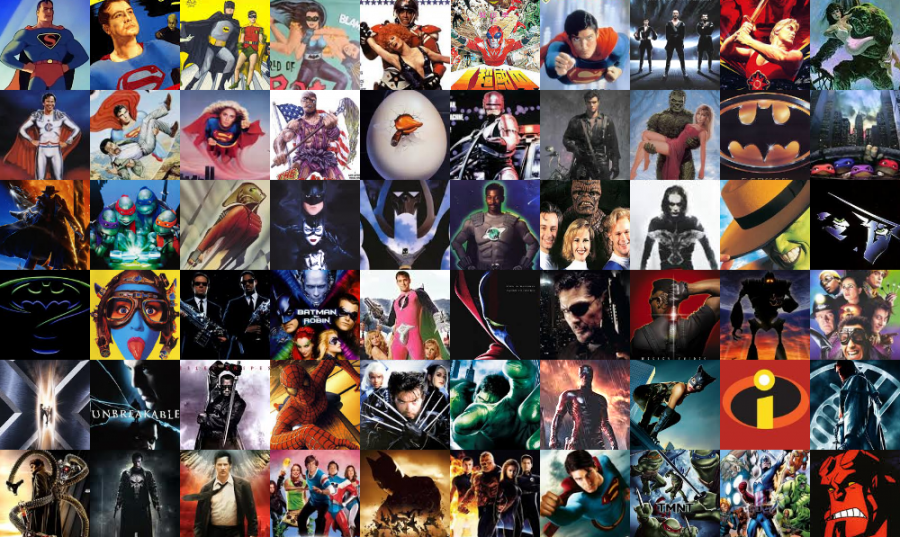Quantity,
The movie industry has undoubtedly seen trends come and go. In the ‘30s it was horror movies. In the ‘50s it was Westerns. It’s not hard to guess what genre has seen increasing popularity in recent years.
It seems like every ad for a new movie has a name from a comic book in the title. With the same characters everyone is familiar with fighting villains in front of big explosions, it’s clear that studios aren’t making these movies because they believe they’re the best stories they can tell. As more and more of these films are released, the templates in use for developing their formulaic scripts is becoming stale. “I wish there were less superhero movies because most of them are pretty much the same thing,” senior Eric Quam said. “Plus, other movies can’t really compete with the advertising that they do. I don’t know what movies are out right now, but I do know that there’s definitely some superhero movies out.”
What’s made this genre so popular is its financial success combined with its ease of creation. While undoubtedly there are many impressive technical aspects to these films such as the incredibly detailed CGI that the genre makes great use of, the issue with these movies comes in the writing. With a few notable exceptions like The Dark Knight, superhero movies are susceptible to falling under the same general storylines and character arcs. “Most of the time it’s the same thing in every movie,” sophomore Ari Glazier said. “First, the enemy of the main character starts doing something bad, usually in some big city. Then the main character starts fighting, and just as they’re about to die they win, and it teaches them an important life lesson. Honestly, anime is a better genre.”
Hollywood’s obsession with making sequels is an undeniable problem, and superhero movies are the worst offenders. Marvel has made 20 films in the Marvel Cinematic Universe with 12 more in production. So not only are these 32 films all taking place in the same world, often sharing cast members, but they are all also adaptations of comics.
Marvel is utilizing the success of comics to make movie adaptations, then making sequels of the adaptations. Why would Marvel stick to such a boring formula? Well, according to Box Office Mojo, the total budget for these 20 films was $3.807–$4.049 billion. The total box office was $17.528 billion. When looking at extreme profit like that, Hollywood’s extreme superhero craze begins to make a lot more sense. Until another genre begins to show consistent financial success, studios won’t risk spending the same amount on superhero movies as they do other, more risky and ambitious films.
-Riley Jordan
social media editor
Quality,
Before you continue reading this article, full disclosure requires me to tell you that I am a superhero movie fanatic and it was incredibly difficult to write the following words. Anyways, here it goes.
There are too many superhero movies.
It’s an opinion I’ve been hiding from the world for years. I’ve been watching superhero movies for over 10 years and I have become enamored of these characters who’ve not only shaped my childhood but my personality in general. I’ve developed the moody nature of Batman, the nobility of Black Panther and the sarcasm of Doctor Strange.
Most people develop in conjunction with their peers and the world around them but instead, I’ve grown up alongside each new Iron Man suit to be featured in a Marvel movie. This particular aspect of my childhood is shared with hundreds of thousands of other teenagers, including those at this school. “Superhero movies were one of my favorite source of entertainment as a kid and brought me the most enjoyment out of all other types of movies,” senior Kayla Choi said.
While I cherish the experiences I’ve shared with family and friends watching the latest superhero flick, I’m a bit fatigued. Within the past two years, there have been 16 widely-released films centered around superheroes. From Wonder Woman to Ant-Man and the Wasp to The LEGO Batman Movie, audiences have been overwhelmed by the presence of crime-fighting heroes, even if they do kick butt. “There’s just too many movies to watch on a regular basis and movies are just too expensive to keep up,” junior Sophia Miller said.
However, the number of movies is not necessarily the big issue. Rather, the near constant flood of bad superhero movies is the cause for the oversaturation facing the American public. One guilty party in the creation of poor films is the DC Extended Universe. Home to the iconic characters of Superman, Batman, and Wonder Woman, the DCEU has completely dropped the ball with the material they were gifted by DC Comics.
Aside from the surprising hit of Wonder Woman, all of the films in the DCEU’s lineup, like Batman v. Superman and Suicide Squad, have been utterly disappointing. What made the Marvel Cinematic Universe so successful was the precision it took to respect the original source material and establish likeable characters over the course of several films. “Some companies, like Warner Bros, who run the superhero franchises, are really only concerned with bringing in revenue rather than the quality of the movies,” Choi said.
Ultimately, superhero movies are a harmless form of easy, popcorn-perfect entertainment but it’s important to be conscious of their presence in our society. Average movie viewers, as well as comic book readers, may feel overwhelmed by the rapid-fire release of these films, especially the poorly-received ones. “Look at Venom; that was a recent superhero movie that was not very good but a genuinely unnecessary production altogether,” English teacher Kristen Haynes said.
So as a note to major movie studios with the rights to superheroes, please be conscious of the material you put out into the world. Be excited to use these characters to create engaging stories rather than using them as cash cows every few months. Millions of fans have been beat over the head with bad movies and it’s time for a change. Either actually attempt to put out well-produced films or reduce the frequency of superhero movie releases. Sincerely, this diehard fan.
-James Barberis
managing editor







![The 2025-2026 Editorial Board Alex Grainger, Cameron Cowen, Helen Manolis, Emory Scofield, Ahmed Ibrahim, Rebekah Buchman, Marley Hoffman, Hayley Gottesman, Pragna Pothakamuri and Natalie Pak (Chase Dolan not pictured) respond to the new MCPS grading policy. “When something that used to be easy suddenly becomes harder, it can turn [students’] mindset negative, whereas making something easier usually has a better impact. I think that’s where a lot of the pushback comes from. But if you put emotions aside, I do think this change could help build stronger work ethic,” Ibrahim said.](https://woottoncommonsense.com/wp-content/uploads/2025/09/fqr5bskTXpn0LRQMmKErLuNKdQYBlL726cFXBaWF-1200x900.jpg)
